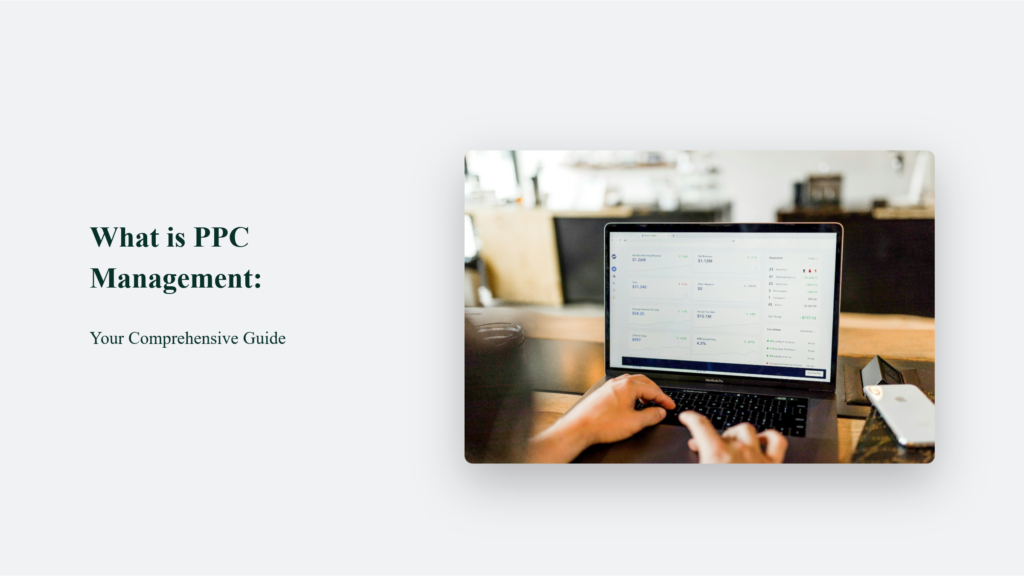In today’s digital-first marketplace, Pay-Per-Click (PPC) advertising stands as a cornerstone for businesses aiming to thrive online. The art and science of PPC management, a complex yet captivating realm, involves steering the ship of your online advertising strategy towards uncharted waters of success and profitability. But what is PPC management, and how can mastering it transform your business landscape? Let’s dive deep into this intriguing world, guided by insights, anecdotes, and the wisdom of seasoned experts.

What is PPC Management?
PPC management is the helm at which digital marketers and businesses stand to navigate the vast sea of paid online advertising. At its core, PPC management encompasses a spectrum of activities – from keyword research and selection, ad copywriting, bid management, and analytics to optimisation strategies that aim to maximise ROI. The goal? This is to ensure that every click not only counts but also converts.
The Pillars of Effective PPC Management:
The essence of effective PPC management lies in a holistic approach that spans strategic ad creation and campaign setup, meticulous landing page optimisation, and a commitment to continuous optimisation and testing. Let’s explore these pillars further.
Strategic Ad Creation and Campaign Setup
At the heart of PPC management is creating ads that resonate with your target audience and the strategic setup of campaigns to ensure they reach these potential customers. This process involves a deep dive into market research to understand customer behaviour and preferences.
By selecting the right keywords and crafting compelling ad copy, PPC professionals aim to attract not just any traffic but highly relevant traffic to the product or service being offered. This relevance is crucial as it significantly enhances the likelihood of conversion, making every click a potential lead.
Landing Page Optimisation: The Unsung Hero
The role of the landing page in a PPC campaign cannot be overstated. Once a prospective customer clicks on an ad, the landing page becomes the forefront of the conversion process. Optimising these landing pages to align with the user’s search intent and the message conveyed in the ad itself is critical.
This optimisation includes ensuring the content is relevant, the page design is user-friendly and calls to action (CTAs) are clear and compelling. By doing so, businesses can significantly improve their conversion rates, turning clicks into valuable customer actions.
Continuous Optimisation and Testing
The digital advertising landscape is ever-evolving, constantly changing user behaviour and market trends. Therefore, continuous optimisation and testing become vital components of successful PPC management. Techniques such as A/B testing allow advertisers to compare different elements of their ads and landing pages to identify what works best. Similarly, analysing the quality score provided by platforms like Google Ads helps understand the relevance and effectiveness of ads, keywords, and landing pages. Regularly adjusting bids and strategies based on performance data ensures that campaigns remain competitive and cost-effective.
By embracing these pillars of effective PPC management, businesses can navigate the complexities of paid online advertising with greater precision and success. The ultimate goal is to create a cycle of improvement that continuously enhances campaign performance, maximises ROI, and achieves the desired outcomes, whether they be increased sales, leads, or brand awareness.
Leveraging Tools and Technologies in PPC Management:
In the digital marketing landscape, PPC management is a sophisticated domain requiring not just strategic understanding but also the support of powerful tools and technologies. These resources are designed to streamline the process, from planning to execution and analysis, enabling businesses and marketers to achieve optimised results with their PPC campaigns. Below, we delve into some of the key tools that are indispensable for effective PPC management.
Keyword Research Tools
Google Keyword Planner: This tool is a staple for any PPC campaign. It offers deep insights into keyword search volume, competition, and potential cost-per-click (CPC). It’s invaluable for identifying relevant keywords that can drive targeted traffic to your website.
SEMrush: Offering a suite of SEO and PPC tools, SEMrush excels in comprehensive keyword research, competitive analysis, and PPC audit features. It allows marketers to uncover their competitors’ strategies and find profitable keywords.
Analytics and Performance Tracking
Google Analytics: A crucial tool for any digital marketer, Google Analytics provides detailed insights into website traffic, user behaviour, and conversion tracking. Integrating GA with your PPC campaigns allows for precise campaign success and ROImeasurement.
Hotjar: While not a traditional PPC tool, Hotjar offers valuable insights into user behaviour on your website through heatmaps, session recordings, and conversion funnels. These insights can help optimise landing pages for better PPC campaign performance.
Campaign Management and Optimisation
WordStream is a comprehensive PPC management tool that simplifies campaign management across platforms like Google Ads and Facebook Ads. It offers features like the 20-Minute PPC Work Week, which suggests changes to improve campaign performance.
Optmyzr: This tool provides advanced PPC optimisation features, including bid management, quality score optimisation, and automated rule-based campaign management. It’s designed to save time and improve campaign results through automation and insights.
Automation and AI Technologies
AdEspresso by Hootsuite: Focused on social media advertising, AdEspresso offers a user-friendly platform for creating, managing, and optimising ads across Facebook, Instagram, and Google Ads. It features A/B testing capabilities and powerful analytics.
Kenshoo: Known for its advanced automation features, Kenshoo supports cross-channel campaign management and optimisation. It leverages AI to predict campaign performance and offers budget allocation recommendations to maximise ROI.
Competitive Analysis
SpyFu: A tool specialising in competitor analysis, SpyFu allows marketers to see which keywords competitors are bidding on and how their ads perform. This insight can help refine your PPC strategy and identify new opportunities.
Conclusion
The realm of PPC management is dynamic and competitive. Leveraging the right tools and technologies can significantly improve the success of your campaigns. From keyword research and analytics to optimisation and competitive analysis, each tool offers unique benefits that can help sharpen your PPC strategies, improve campaign performance, and ultimately drive higher ROI. Digital marketers need to stay updated with the latest tools and technologies in PPC management to maintain a competitive edge in the digital advertising space.
Frequently Asked Questions:
Is PPC management necessary for all businesses?
Can small businesses benefit from PPC management?
Absolutely. Small businesses, in particular, can benefit from the targeted approach of PPC advertising, ensuring their ads reach the right audience without overspending.
How often should PPC campaigns be reviewed and optimized?
Continuous monitoring is key. Regular reviews (at least monthly) help in identifying opportunities for optimization and adjusting strategies based on performance data.




